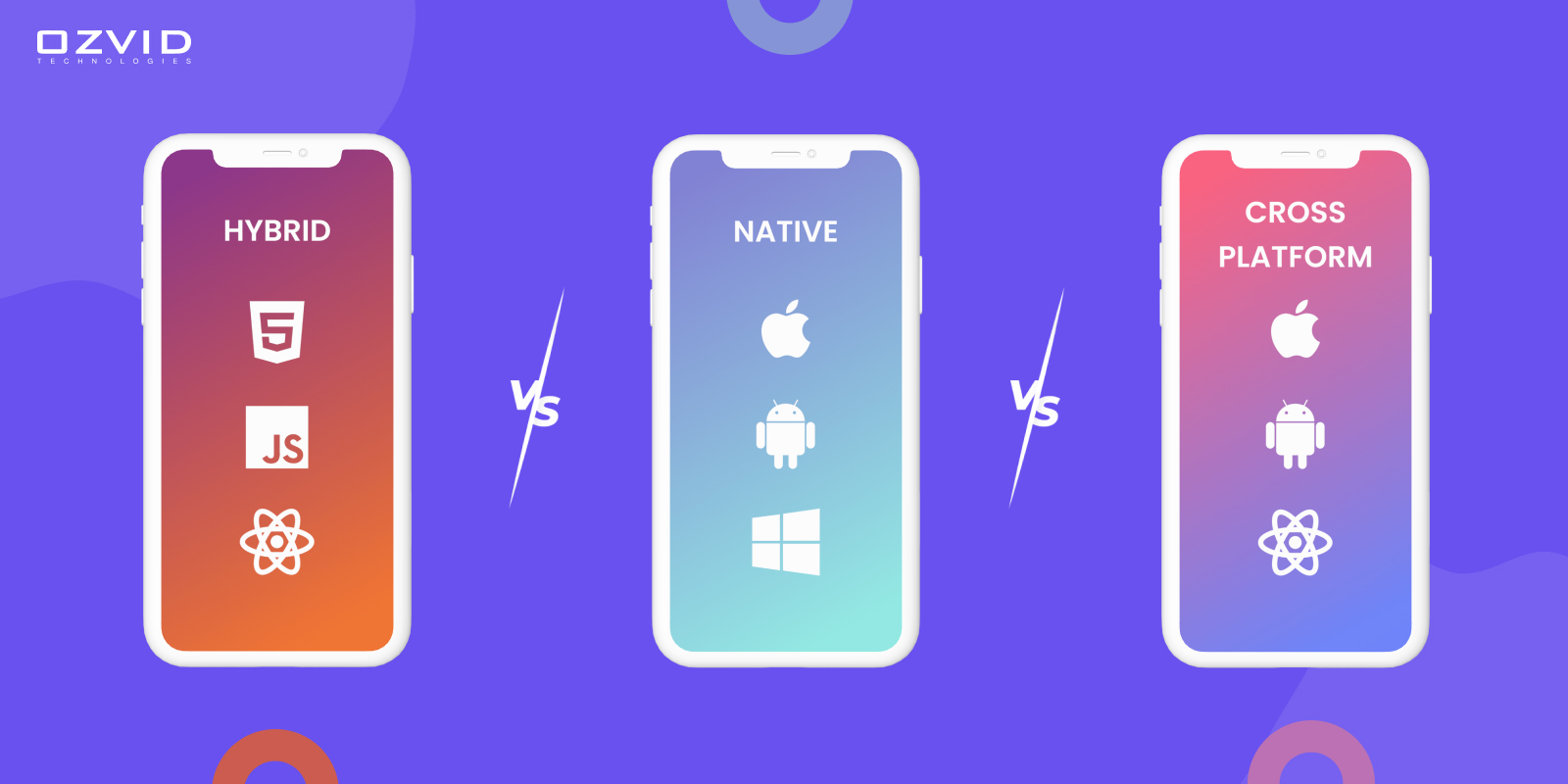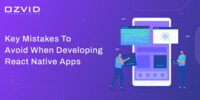- Mar 13, 2024
- Mobile App Development
- 25592
Share this post on:

Today, we are dealing with a wide range of mobile applications and various mobile development platforms. Businesses must be careful while choosing their app development approach, as it can directly impact your mobile app’s success. It can be confusing to decide between Native, Hybrid, and Cross-platform mobile apps. The reason is that each type of platform has its specifications which makes the confusion more reasonable. So, which app development platform should you choose for your business?
The popularity of smartphones is growing exponentially, and our lives have become more confined to digital assets. A report from statista projected to generate around 613 billion U.S. dollars by 2025. Not only that, there is neck-to-neck competition which forces businesses to focus on high-quality and other convincible parameters. It makes potential customers choose your services over others.
In this blog, we will discuss and provide insight into various app development approaches.
What is Native App Development?
The app built for specific operating systems using a platform-specific programming language is called Native App. The Android platform uses programming languages like java and Kotlin, and iOS Native Apps use languages such as Objective C or Swift.
Native Apps are high-performance and provide a better user experience because of their quality to leverage the advantage of the operating system’s features. Also, native apps give access to the hardware of devices such as GPS, Camera, Microphone, offline access, and many more.
Examples of Native Apps:
- Google Maps,
- Artsy,
- Pinterest,
- Spotify, and more.
What are the benefits of Native Apps?
Let us now shed light on the benefits of Native Apps:
- Reduced Errors
- High Performance
- High Speed
- Offline Functionality
- More Interactive
- High Security
Now, let us explain all of these in detail:
Reduced Errors: Native apps allow developers to use one codebase and are free from cross-platform tools. It causes fewer errors which makes them more reliable and efficient.
High Performance: Apps developed using native app development are optimized for a specific platform and ensure high performance. These apps are platform-specific and make them responsive and fast.
High Speed: Since Native apps do not have complex coding structures, making faster than Hybrid and Cross-platform apps. Due to their high speed and cost-effectiveness, they are used widely among businesses.
Offline Functionality: Native apps can operate in offline mode without any error. It allows developers to access the app functionalities during airplane mode or with limited data availability.
More Interactive: The apps are built for a specific OS and follow the guidelines. And makes users interact with the applications in a friendly way.
High Security: Native Apps uses technologies like HTML5, JavaScript, or CSS, ensuring security and data protection on the user’s end.
What are the cons associated with Native App Development?
Now that we have discussed the benefits of Native Apps. Let us not see some of the cons of Native App Development.
- No code reusability
- High maintenance
- Need more skills and talent
Let us now discuss all the above points in detail.
No code reusability: The native apps help various operating systems like iOS and Android. The code written for both platform are separate and demands time, effort, costs, and resources.
High maintenance: The apps come with a high maintenance cost. Sometimes the maintenance cost is more than the actual development.
Need more skills: The native apps are language specific. It is hard to find developers who can code in all languages.
What are the tools used in Native Mobile App Development?
The tools used in Native Mobile App Development may vary according to the apps. The tools used are Android Studio and IntelliJ IDEA for Android App Development, and for iOS Development, the tools are Xcode and AppCode.
What is Hybrid App Development?
Hybrid app development is an encapsulation of both native and web solutions. Developers embed code written with web development languages like HTML, CSS, and JavaScript into native apps using plugins. Hybrid apps comprise two components: a backend and a native viewer. These apps can be deployed on platforms and can download the same as a native app.
Also, the code written once can be used on multiple platforms while maintaining performance and user experience.
Examples of Hybrid Apps:
- Gmail,
- Evernote,
- Instagram, and more.
What are the benefits of Hybrid Apps?
Let us now shed light on the benefits of Hybrid Apps:
- Fast Development
- Easy Maintenance
- Budget Friendly
- Improved UI/UX
Let us discuss the above points in detail.
Fast Development: Fast MVPs are the need of businesses these days. It has become an ideal choice among companies because it ensures rapid development and launch of the app in the market.
Easy Maintenance: The apps use web-based technologies that make it simple to maintain as compared to native and cross-platform that have complex coding.
Budget Friendly: The hybrid apps are budget friendly and ensure unified development. The app development allows developers to develop a single version for multiple platforms.
Improved UI/UX: Hybrid app development integrates the benefits of native and web apps while offering.
What are the cons associated with Hybrid App Development?
- No Offline Support
- Operating System Incompatibility
Let us now discuss all the above points in detail.
No Offline Support: Users must wait for an internet connection to access the app’s functionalities, as no offline support is allowed.
Operating System Incompatibility: It is OS-Specific as only one code is used for deployment on multiple platforms, making it unsuitable for other systems.
What are the tools used in Hybrid Mobile App Development?
The tools used for Hybrid Mobile App Development are Ionic and Apache Cordova.
What is Cross Platform App Development?
Cross-platform app development is always surrounded by confusion, as it has code shareability features. The businesses mistook it for a hybrid platform. And consider both Hybrid and Cross-platforms to be the same. But they are entirely different from each other. The cross-platform follows a strategy that develops shareable and reusable code for building apps for different OS. The apps are time-saving and highly cost-effective.
Even though the platform ensures easy and robust implementation at the most affordable prices, it does not offer high-performance and customization features.
Examples of Cross-Platform Apps:
- Skype,
- Bloomberg,
- Slack, and more.
What are the benefits of Cross Platform App Development?
Let us now shed light on the benefits of Cross Platform App Development:
- Highly Productive
- Maintenance
- Cost-Effective
- Code Reusability
Let us discuss the above points in detail.
Highly Productive: The liberty to reuse code allows developers to develop apps with improved productivity and efficiency. It gives a cross-platform app development framework a competitive edge over other platforms.
Maintenance: One codebase feature makes it easy for businesses to maintain the app. It is easy to test and deploy fixes and upgrades. It ensures that the mobile applications developed provide higher accuracy and superior quality.
Cost-Effective: The cross-platform app development framework supports all platforms at the most cost-effective prices. It helps you reach more potential audiences and increase brand popularity.
Code Reusability: The platform offers the unique capability to use the same code for each operating system. Also, you can use a common codebase for transferring code to different platforms.
What are the cons associated with Cross Platform App Development?
- Complicated Development Process
- Complicated Integration
Let us now discuss all the above points in detail.
Complicated Development Process: It is crucial to have skillful developers on the team because of the complex development process. Development needs precise observation while OS and hardware are running on complex interfaces.
Complicated Integration: Integration of cross-platform apps into local settings is complex. Also, the code of HTML5 cross-platform apps is highly complicated due to its callback-style programming.
The Comparison: Native vs. Hybrid vs. Cross-Platform
Now that we have learned about the various mobile platforms, now let us compare all these platforms and understand what can be the best approach for the business. Also, the best approach depends on the user’s requirements, budget, business model, and other parameters.
Even though all these platforms provide great functionality, depending on the parameters and their functionality, one can decide the best one for your business.
- Performance
- Pricing
- Security
- Time
- UI/UX Customization
Let us explain each of these parameters in detail.
Performance: Native app development enables developers to use advanced features such as USB input, complex networking, memory management, etc without any speed limitations and app performance. Also, the unmatched user interface updates as the OS updates. On the contrary, the Hybrid has limited OS features, and the Cross-platform also has limitations but fewer than the Hybrid, depending on the framework you choose.
Pricing: Pricing is always the foremost concern of every business. All are looking to develop mobile apps which are high-quality and user-friendly in the most cost-effective ways. When budget is of concern, it is crucial to choose Cross-platform app development. It allows developers to write code that integrates easily with the required OS. Moreover, cross-platform app development needs fewer efforts and resources than Hybrid and Native App Development.
Security: Security is a crucial concern among businesses as it safeguards business and customers’ data. According to a study, there were 4,145 publicly disclosed data breaches in 2021.
Also, the average data breach costs a whopping $4.35 million and takes approximately 287 days to identify a data breach.
If businesses are dealing in eCommerce or any other related industry where customer data is involved, it becomes necessary to focus on security.
Time: The market is full of mobile apps. Approximately 29.5K mobile apps come out every month on Apple Store. And it shows how stiff the competition is and how important it is to launch your app on Play Store. In comparison, native apps take sufficient time, but hybrid and cross-platform apps are faster. So considering the time, it is better to choose hybrid and cross-platform development.
UI/UX Customization: User retention is crucial for any business, as it helps in increasing sales and revenue. A report says that 70% of customers have left shopping carts because of their bad experience. And 90% say that they are more likely to use the app and continue shopping if the interface is user-friendly. So when it comes to UI/UX customization, native application development is the best.
Although Cross-platform frameworks such as Flutter or React Native are better than the Hybrid framework. But overall, native app development is the game changer.
The best practices while choosing the right development strategy
The best practices while choosing select the right development strategy for an app to succeed are as follows:
- It is better to aim for the target group of user-friendly apps
- Measure the level of functional complexities
- Maintain the UI/UX requirements
- Ensure to have all the development resources – available and affordable
- Keep checking the requirements and the required updates
Conclusion
Choosing the best platform can be challenging, and it is crucial to take the help of the experts. Experts are well-versed with the latest technology and can help you choose the best for your business.
So, if you are looking for the best and top-notch Mobile Development Services, you are at the right place.
We at OZVID Technologies ensure that customers get the best solution in the industry with the best tools and platforms, which can help them grow in their respective industries.










